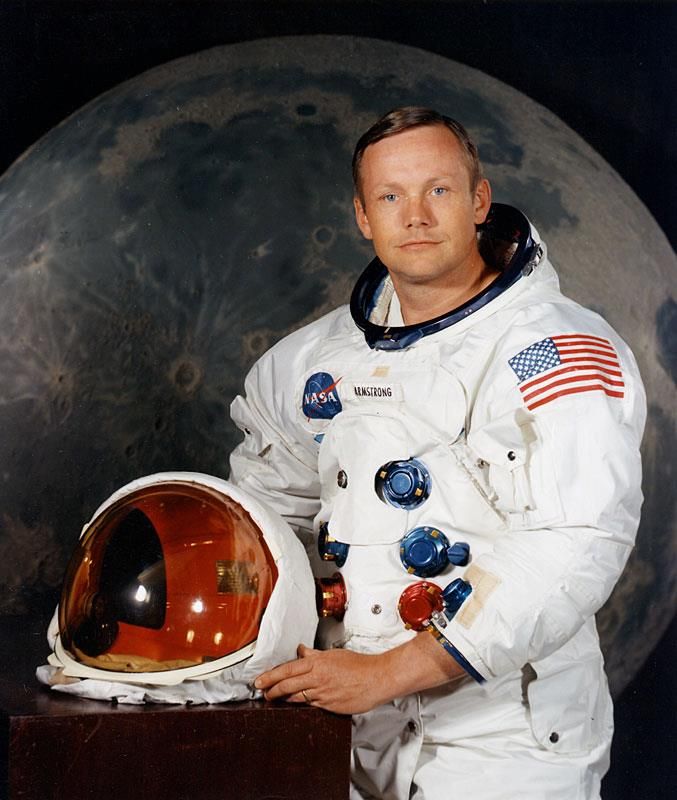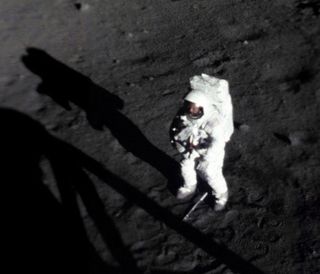Neil Armstrong, First Man to Walk on Moon, Dies at 82

Astronaut and American icon Neil Armstrong, the first person ever to set foot on the moon, has died at the age of 82.
Armstrong, who stepped onto the lunar surface on July 20, 1969 as commander of NASA's Apollo 11 mission, died Saturday (Aug. 25). The news was first reported by NBC News and confirmed in a statement by the Armstrong family. He had undergone a cardiac bypass operation on Aug. 7, two days after his 82nd birthday.
"It saddens us to report that the first astronaut to walk on the moon has passed away," NASA wrote in a statement.
Armstrong uttered one of the most famous phrases in human history upon making his extraterrestrial foray: "That's one small step for [a] man, one giant leap for mankind." [Photos: Neil Armstrong Remembered]
Armstrong and Apollo 11 lunar module pilot Buzz Aldrin spent more than 21 hours on the moon and performed the first-ever moonwalk during their historic mission, while crewmate Michael Collins orbited above in their command module Columbia.
"He was the best, and I will miss him terribly," Collins said in a statement.

Neil Armstrong started out flying planes. He was a naval aviator from 1949 to 1952, flying 78 combat missions during the Korean War. He joined NASA's predecesor organization, the National Advisory Committee for Aeronautics, as a test pilot in 1955 and ended up flying more than 200 different types of aircraft, including the X-15 rocket plane.
Sign up for the Live Science daily newsletter now
Get the world’s most fascinating discoveries delivered straight to your inbox.
Armstrong became an astronaut in 1962 and went to space for the first time in 1966 aboard NASA's Gemini 8 mission. On that flight, he and crewmate David Scott performed the first-ever space docking, hooking up with an Agena satellite.
Apollo 11 was Armstrong's second spaceflight, and also his last. The mission blasted off on July 16, 1969 and splashed down safely in the Pacific Ocean eight days later.
After returning to Earth, Armstrong taught aerospace engineering at the University of Cincinnati and later served as chairman of the Virginia-based Computing Technologies for Aviation, Inc., according to NASA. He and his wife, Carol, made their home in the Cincinnati area.
Armstrong rarely returned to the spotlight, though he recently spoke at several congressional hearings on the future of NASA's human spaceflight program.
In November 2011, Armstrong and his Apollo 11 crewmates Aldrin and Collins received the Congressional Gold Medal, the highest award Congress gives out. Former astronaut John Glenn, the first American to orbit Earth, also received the award during the ceremony.
"While we mourn the loss of a very good man, we also celebrate his remarkable life and hope that it serves as an example to young people around the world to work hard to make their dreams come true, to be willing to explore and push the limits, and to selflessly serve a cause greater than themselves," Armstrong's family said in its statement.
“For those who may ask what they can do to honor Neil, we have a simple request. Honor his example of service, accomplishment and modesty, and the next time you walk outside on a clear night and see the moon smiling down at you, think of Neil Armstrong and give him a wink."
This story was updated at 4:53 p.m. EDT.
Follow SPACE.com for the latest in space science and exploration news on Twitter @Spacedotcom and on Facebook.













